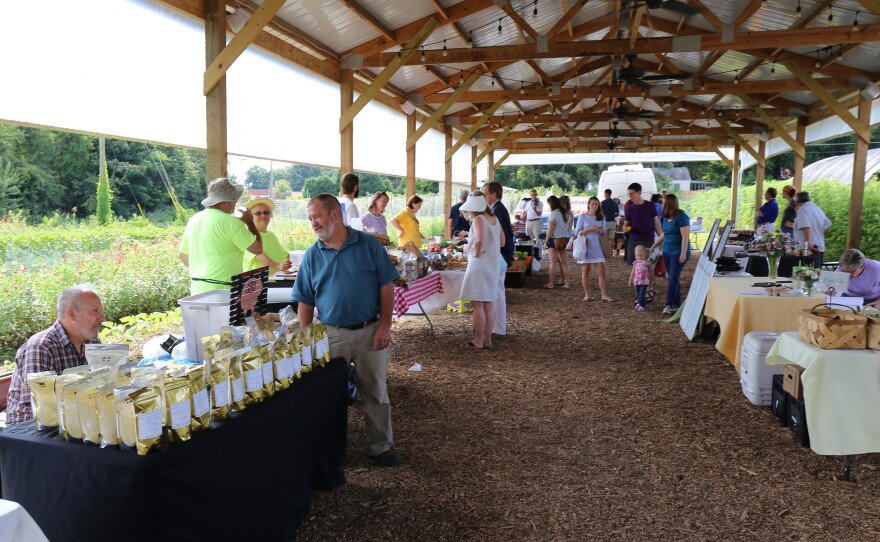At the City Roots Farmers Market in downtown Columbia, Cathy Watson lays out squash, kale, and peaches at her booth. She got into farming 36 years ago when she married the fourth generation owner of Watsonia Farms in Monetta. At City Roots she meets a lot of young farmers just getting into the industry. With the increasing popularity of locally grown food nationwide, agricultural states have seen a new crop of farmers join the profession—people who didn’t grow up on farms, college graduates, mid-career professionals making a change. South Carolina Public Radio's Laura Hunsberger has the story.
From the Reporters Desk... by Makayla Gay
This story drew from my own personal experience grown up on a farm in Kentucky. Like many children and grandchildren of farmers, as I grew up the family farm became more of a nostalgic memory than a possible occupation. I’m interested in exploring how this cultural shift affects the farming industry, not only in my home state but also across the country, including South Carolina. Farms aren’t being handed down to the next generation: the kids of these farmers are leaving to pursue other opportunities.
Dave Lamie is an associate professor and extension specialist at Clemson University. According to Lamie, farmers are aging out of the industry with no one to whom to pass on the business. “The average age of the farmer is approaching 60 years of age, at the national level,” he says. “It used to be that 80% of the population had some attachment to the land that was being actively farmed, and somewhere in the last century we really saw strong declines where 2% of the populations are actively farming.”
Lamie runs the New and Beginner Farmer program at Clemson University. The program educates these new farmers, mostly individuals who have no farming background or have come back to their farming roots after a few years. Some of these newcomers are people coming right out of college, but Lamie has often seen people coming into the program after a mid-career change or due to economic downturn.

Eric McClam left a career as an architect to help his father start City Roots Farm in Columbia, SC in 2009. From pulling weeds on the three acre lot to designing greenhouses, McClam has turned to agriculture as his full time career. McClam says he never expected that being a farmer would be cooler than being an architect, but like many on his team, working with the land appealed to him.
“Our average age on the farm is mid-twenties. We’ve got people everywhere from illiterate to Masters to PhDs on the farm,” McClam says. “They are a little disenfranchised when they graduate and maybe spend a little time in a cubicle and decided ‘this isn’t for me’ and they want to do something else.”
As a college grad with a philosophy degree, Brinton Fox is doing something she probably didn’t expect to be doing: farming. Fox is the Cut Flowers Manager at City Roots, and she wants to open up her own farm one day. Along with many new farmers, she’s found it isn’t easy to get started. “Being a young farmer and a farmer not inheriting land, there’s a lot of risk in me opening up my own business and buying land,” Fox says. Not only is it expensive, it’s hard to find. “In South Carolina there seems like there’s a lot of farm land, but the more our cities and developments spread out, the more our farmlands turn into something else."

The South Carolina Department of Agriculture has a land-link program underway to connect land owners who want to pass off their land to the next generation of farmers. Dave Lamie explains that lot of new farmers are locked out of larger-scale farming because it’s so expensive. “I think that’s why we see so many new farmers coming on board with much smaller operations focused on niche products,” he says. “Many of them are coming in with good market savvy and good technical skills to be able to produce high value crops that represent niches that can penetrate those markets with unique products.”
City Roots has found their niche product in micro greens, which the farm supplies to restaurants and grocery stores across the state. In addition, the farm hosts festivals and farm-to-table dinners, among other events. Eric McClam says the special events, like the weekly farmers market, do more than just diversify their product offerings: it lets the surrounding community experience farming life.
“I think food is what brings us all to the table both literally and figuratively it’s something we all need to eat have to eat and most of us enjoy it. So wanting to know how food is grown, where it’s grown, what the diversity of South Carolina can produce, has brought a lot of people to our farm and others in the area,” says McClam. The rise in popularity of agro tourism, local and organic produces has turned the world’s attention back to the source of our food. McClam thinks the draw of farming is natural: “It’s our inherent desire of wanting to get back to the land… and wanting to know where our food comes from.”






